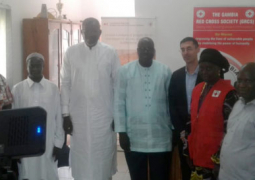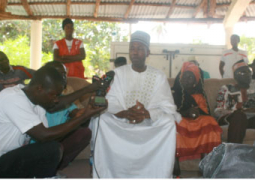3. Voluntary death (mawt-i ikhtiyari)
Among the sacred teachings of the Prophet is voluntary death. Voluntary death is the fountainhead of the spring of immortal life, for unless the human being experiences death, he cannot set off on the spiritual path, and unless the experiences mortality, he cannot know immortality. The mystic on the quest to divine union is constantly experiencing death; he dies and dies again. The dichotomies of life beleaguer him incessantly: “I” vs.”He”, the material vs. the spiritual, the self vs. God.
Such dichotomies affect every moment and aspect of his life, the trivial as well as the significant. He is constantly faced with problems arising from these dichotomies, and it is in the strife and conflict posed by these dichotomies that he senses true life. As such, while on the spiritual path, the wayfarer is perpetually on the verge of death, the conflict of the evil inciting (ammarah) and deceiving (musawwilah) self with the intellective (‘aqilah), virtue-inspiring (mulhimah), and assured (mujma’innah) self consumes him until he tastes death. The bitter pangs of this voluntary death result in a spiritual intoxication and swoon that in turn beget the sweetness of theophany and a sobriety (sahw) that is consequent on the thoroughness of the primordial intoxication (sahba-yi alast).
The Greatest of Prophets (may God’s peace and blessings be upon him and his household) said, “Die before you die” (Hasanzadih Amuh, Shrh’uyun masayil nafs, vol. 2, p. 362). That is, the natural and inevitable death will sooner or later befall us, so we must prepare for it and welcome it. In one supplication, the Prophet addresses God in these words:
O my God, enable me to distance myself from world of delusion [i.e, the material world], to turn to the Abode of Eternity, and to prepare for death before I perish.
In this supplication, the Prophet teaches us that we must endeavour to flee from the realm of multiplicity to that of unity, from the transient material abode to the abode of permanence. We must welcome death, for death is to behold the Beloved rather than the self. Prior to death and the preparation for it, we are in essence dead, and it is only at death that we awaken: “People are sleep; when the die; they gain consciousness” (Bihar al-anwar, vol. 5, p. 134).
However, “true death”, which is that most perfect manifestation of eternal life, is not easily accomplished. It requires that one should undertake spiritual exercises (riadat) and embark the path of spiritual struggle (mujahadat). Or, in the words of the mystics, one must transcend oneself and become annihilated in God (fana-yi fi-llah) so as to realize death (Imam Khumayni, 1373, pp. 623-625). The Quran affirms, “Whoever leaves his house, journeying toward God and His Prophet, and is then overtaken by death-his reward shall fall on God” (QURAN 4:100). And the reward of voluntary death is immortality, for this death is in fact a sublime rebirth, which involves completing the journey on the Arc of Ascent following the completion of the journey on the Arc of Descent. Shaykh Shabistari describes this journey as “that is the reverse of the first (Shabistari, 1368, p. 25).
Mystics classify death into four types: 1. The red death, which consists in the wayfarer’s battle with his evil-inciting self; 2. The white death, which involves enduring hunger thereby obtaining luminosity of soul and “whiteness” of the heart; 3. The green death, which is to lead a humble lifestyle and to wear menial clothing; 4. The black death, which is consequent on bearing the reproach of the ignorant and the difficulties of the spiritual quest (Hasanzadih Amuli, Sharh ‘uyun masayil nafs, p. 154). The realization of voluntary death-which is to transcend the immateriality (tajarrud) and identification (tawahhud) and to transcend the material realm to arrive at the spiritual, to rise above the corporeal realm (nasut) and attain to the Supernal Majesty of God (jabarut)-rests on the fulfilment of the above deaths. In the words of Allamah Hasanzadih Amuli, “Voluntary death is true life: you cannot know this unless you taste it” (Hasanzadih Amuli, Hizar-u yiknuktih, p. 248).
Imam ‘Ali (peace be upon him) is reported as having said, “Die before you die, and remove yourselves from your bodies before you are removed [against you will]” (Nahj al-balaghah, speech no. 143). Voluntary death is a resurrection that takes place within the wayfarer’s soul, turning his attention away from the exterior of the world and the exoteric aspect to the interior of the world and its exoteric aspect in order that he may behold the Beloved and actualize the latent potentials of his existence. By undergoing this death, one removes the veils from before one’s soul, thus perceiving all that was previously hidden.
4. Self-Knowledge and Self-Realization
One of the prominent elements of the Noble Prophet’s mystic teachings is self-knowledge, which is the necessary preliminary for acquiring knowledge of God. One may even say that self-knowledge is identical with knowledge of God, for the human being who acquires self-knowledge has ipso facto acquired knowledge of God. To liberate oneself from one’s self is tantamount to union with God: “Whosoever knows himself knows his Lord” (Majlisi, ibid., vol. 61, p. 99). Until he succeeds in apprehending his true self by dispelling his illusory self-conception, which is the product of the imagination, the human being remains in a state of unawareness (ghaflat). Once he distinguishes his true self from his false self, the state of awakening obtains and-in the words of the martyred scholar, Murtada Mutahhari-“his soul is set afire, thereby becoming acquainted with the pain [of divine love]” (Mutahhati, Majmu’ih athar, p. 304). Self-knowledge (khudshinnasi) and self-building (khudsazi) constitute the foundation of true mysticism.
There are, however, two types of self-knowledge: theoretic l and practical. The theoretical is realized either discursively or intuitively. To succeed in realizing the latter mode of theoretical self-knowledge means that the wayfarer is no longer aware of himself; the way, too, gradually recedes into oblivion; and thus the only entity that remains is the Destination. This is the stage whereat the wayfarer is utterly overwhelmed by the unity of Divine Actions, Attributes, and Essence, thus perceiving exclusively the Beloved, acknowledging immediately that He is the First and Last. This stage is also referred to as vanishment (mahw), eradication (tams), or abolishment (mahq) (see Jawadi Amuli, vol. 5, pp. 472-4821; see also Hasanzadih Amuli, Sharh ‘uyun masayil nafs, vol. 2, pp. 356-357).
One who accomplishes self-knowledge and self-building transcends the realms of matter (maddih), imagination (mithal), and intellection (‘aql) and arrives at a level where at one is “with the Lord” (ind-arrabb). This exalted state is attained when the human being intuitively comprehends his existential destitution (faqr-i wujudi) in light of self-knowledge. And it is the purpose of the Prophet’s tradition to make the human being aware of his true self. Thus, the Quran asserts. “O believers, take heed of your own soul’s (Quran 5:105). The reason for this command is that the human heart is the existential tablet in which the perfective substantial motion (harakat-i ishtidadi-yi jawhari)-which is the motion stimulate by the love of and passion for God inherent in the human essence-is ingrained. According to Mulla Sadra, “Self-knowledge is the mother of wisdom and the source of all virtues” (Mulla Sadra Sharh hidayah ibn athir, p. 7); or as expressed by Allamah Hasanzadih Amuli, indeed self-knowledge is the key to all supernal vaults” (Hasanzadih Amuli, Hizar-u yik nuktih, No. 709); and ‘Allamah Jawadi Amuli states, “Self-knowledge is the mother of virtues and the source of all knowledge” (Jawadi Amuli, Tafsir tasnim, vol. 3, p. 148).
The Prophet’s instructions on proceeding on the spiritual Path are beautifully articulated in the following dialogue between him and one Mujash ’:Mujashi’: “What is the path to knowledge of God?” The Prophet: “Self-knowledge Mujashi’: “What is the path to comply with God?” The Prophet: “To defy the self”. Mujashi’: “What is the path to securing God’s pleasure?” The Prophet: “The displeasure of the self” Mujashi’: “What is the path to union with God?” The Prophet: “To leave the self behind.” Mujashi’: “What is the path to obedience to God?” The Prophet: “To disobey the self. Mujashi’: “What is the path to the remembrance of God?” The Prophet: “To neglect the self.” Mujashi’: “What is the path to attaining proximity to God?” The Prophet: “To distance oneself from the self”. Mujashi’: “What is the path to becoming intimate with God?” The Prophet: “To disown the self”. Mujashi’: “And how can all this be accomplished?” The Prophet: “To invoke God’s succour against the self.” (See M ajlisi, ibid,. Vol. 7, p. 72 and Nuri, 1404, vol. 11, p. 128) ....
To be continued
Read Other Articles In Article (Archive)




